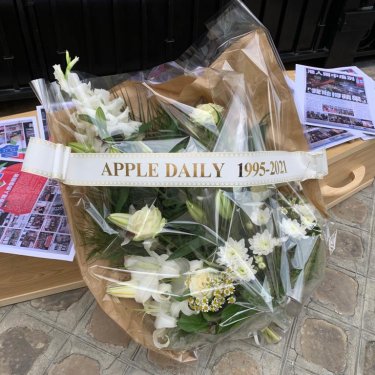RSF’s “funeral protests” highlight urgent risk of death to press freedom in China following closure of Hong Kong media Apple Daily

On 25 June, Reporters Without Borders (RSF) staged parallel protests outside the Chinese embassies in Paris and Berlin, holding funeral-style processions to denounce the killing of Apple Daily by the Hong Kong government, and to raise alarm of the threats posed by the Beijing regime to press freedom globally.
Arriving at the Chinese embassy following a hearse, RSF representatives in Paris staged a mock funeral procession, delivering a coffin and funeral flowers with a placard inscribed “Apple Daily (1995-2021).” In Berlin, RSF representatives staged a parallel action, “burying” the daily newspaper which was one of the last major independent Chinese-language media critical of the Beijing regime.
Two days prior, Apple Daily announced that it must cease all operations from 27 June, with the last print edition of its newspaper to be published on 24 June, due to the government’s decision to freeze its financial assets, leaving the media outlet unable to pay their employees and suppliers.
RSF condemns the killing of the outlet perpetrated by Chief Executive Carrie Lam by order of Chinese President Xi Jinping, and calls for the immediate release of all detained Apple Daily employees as well as the media outlet’s founder Jimmy Lai, RSF 2020 Press Freedom Prize laureate.
“We have gathered today to raise alarm about the urgent risk of death to press freedom in Hong Kong. Democracies cannot continue to stand idly by whilst the Chinese regime systematically erodes what’s left of the country’s independent media, as it has already done in the rest of the country”, RSF Secretary-General Christophe Deloire told reporters gathered outside the Chinese embassy in Paris. “Today’s funeral is for Apple Daily, but tomorrow’s may be for press freedom in China. It’s time for the international community to act in line with their own values and obligations and defend what’s left of the free press in Hong Kong, before China’s model of information control claims another victim.”
Deloire also called out China’s Ambassador to France Lu Shaye, who last week gave an interview labelling media critical of the Chinese regime a "media machine" and journalists criticising Chinese authorities as "mad hyenas". Lu Shaye believes there is no need for a plurality of media: “With two or three groups and a few people, we can become the vanguard of the war of public opinion and we can coordinate this war well.” Lu Shaye has previously been critical of French media, stating last year at the beginning of the Covid-19 pandemics: “I'm not saying the French media always tell lies about China, but much of their reporting on China is not true.”
Earlier this week, RSF submitted an urgent appeal asking the UN to “take all necessary measures” to safeguard press freedom in Hong Kong.
Hong Kong, once a bastion of press freedom, has fallen from 18th place in 2002 to 80th place in the 2021 World Press Freedom Index. The People's Republic of China, for its part, has stagnated at 177th out of 180.



